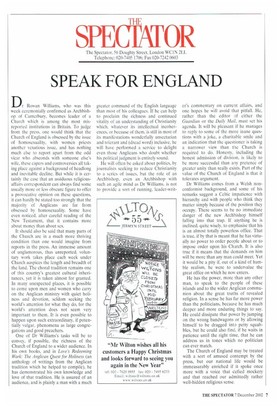SPEAK FOR ENGLAND
Dr Rowan Williams, who was this week ceremonially confirmed as Archbishop of Canterbury, becomes leader of a Church which is among the most misreported institutions in Britain. To judge from the press, one would think that the Church of England is obsessed by the issue of homosexuality, with women priests another vexatious issue, and has nothing much else to report apart from the odd vicar who absconds with someone else's wife, these capers and controversies all taking place against a background of headlong and inevitable decline. But while it is certainly the case that an assiduous religiousaffairs correspondent can always find some usually more or less obscure figure to offer a provocative opinion on these questions, it can hardly be stated too strongly that the majority of Anglicans are far from obsessed by homosexuality. Some have even noticed, after careful reading of the New Testament, that it contains more about money than about sex.
It should also be said that many parts of the Church are in a much more thriving condition than one would imagine from reports in the press. An immense amount of unglamorous, thus unreported, voluntary work takes place each week under Church auspices the length and breadth of the land. The choral tradition remains one of this country's greatest cultural inheritances, yet it is taken almost for granted. In many unexpected places, it is possible to come upon men and women who carry on the Anglican ministry with quiet holiness and devotion, seldom seeking the world's attention for what they do, for the world's attention does not seem very important to them. It is even possible to happen upon such extraordinary, if potentially vulgar, phenomena as large congregations and good preachers.
One of Dr Williams's tasks will be to convey, if possible, the richness of the Church of England to a wider audience. In his own books, and in Love's Redeeming Work. The Anglican Quest for Holiness (an anthology of writings from the Anglican tradition which he helped to compile), he has demonstrated his own knowledge and love of that tradition. He is assured of an audience, and is plainly a man with a much greater command of the English language than most of his colleagues. If he can help to proclaim the richness and continued vitality of an understanding of Christianity which, whatever its intellectual incoherences, or because of them, is still in most of its manifestations wonderfully unsectarian and tolerant and (dread word) inclusive, he will have performed a service to delight even those Anglicans who doubt whether his political judgment is entirely sound.
He will often be asked about politics, by journalists seeking to reduce Christianity to a series of issues, but the role of an Archbishop, even an Archbishop with such an agile mind as Dr Williams, is not to provide a sort of running, leader-writ
er's commentary on current affairs, and one hopes he will avoid that pitfall. He, rather than the editor of either the Guardian or the Daily Mail, must set his agenda. It will be pleasant if he manages to reply to some of the more inane questions with a joke, a charitable smile and an indication that the questioner is taking a narrower view than the Church is required to do. Honesty, including the honest admission of division, is likely to be more successful than any pretence of greater unity than really exists. Part of the value of the Church of England is that it tolerates argument.
Dr Williams comes from a Welsh nonconformist background, and some of his remarks suggest a Celtic impatience with hierarchy and with people who think they matter simply because of the position they occupy. There seems to be no immediate danger of the new Archbishop himself falling into that trap. If anything he is inclined, quite wisely, to emphasise that his is an almost totally powerless office. That is true, if by that is meant that he has virtually no power to order people about or to impose order upon his Church. It is also true if it means that the demands on him will be more than any man could meet. Yet it would be a pity if, out of a kind of humble realism, he were to undervalue the great office on which he now enters.
He has the power, more than any other man, to speak to the people of these islands and to the wider Anglican communion about the great truths of revealed religion. In a sense he has far more power than the politicians, because he has much deeper and more enduring things to say. He could dissipate that power by jumping on the wrong bandwagons or by allowing himself to be dragged into petty squabbles, but he could also find, if he waits in patience until the right time, that he can address us in tones which no politician can ever match.
The Church of England may be treated with a sort of amused contempt by the press, but our national life would be immeasurably enriched if it spoke once more with a voice that defied mockery and that reached our admittedly rather well-hidden religious sense.










































































 Previous page
Previous page